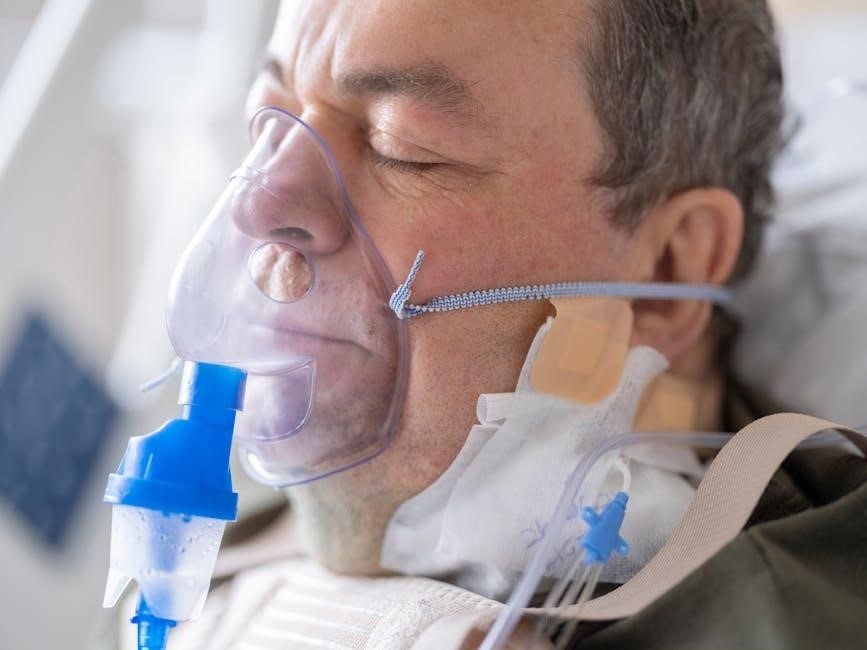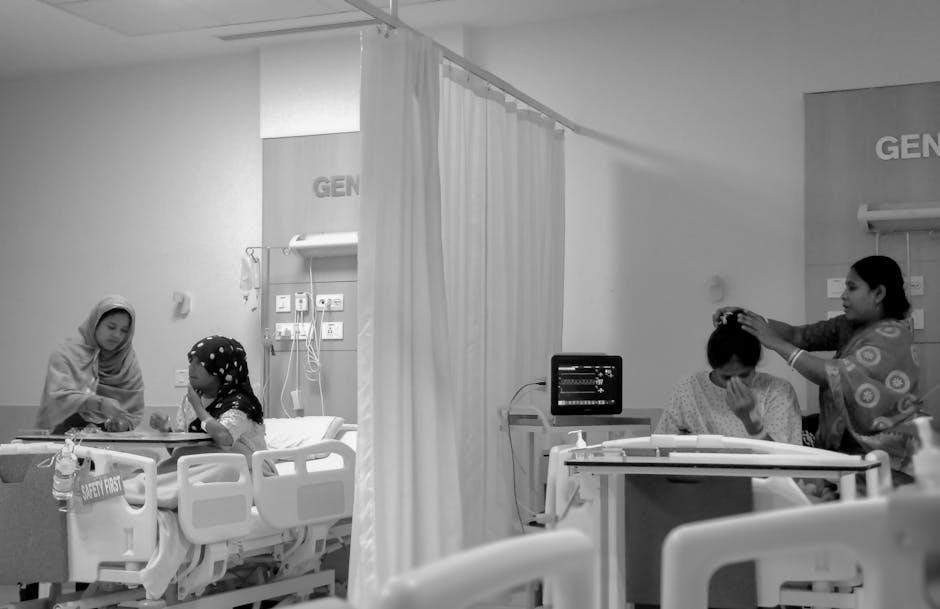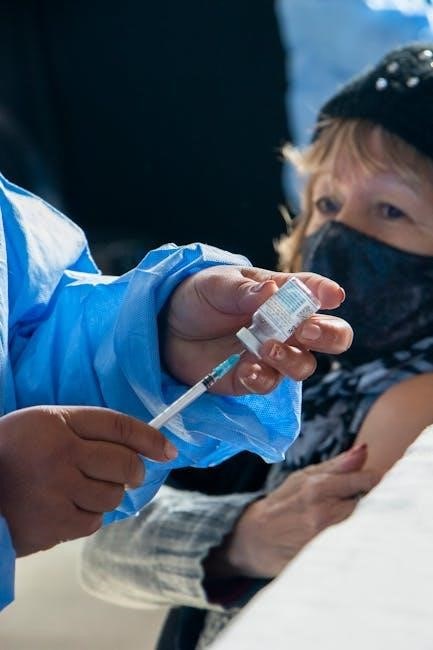
nursing process pdf
The nursing process is a systematic, evidence-based method for delivering high-quality patient care. It emphasizes individualized, holistic approaches to address patients’ physical, psychological, and social needs. Originating in 1955 with three steps, it evolved into a five-step framework by the 1970s, becoming a global standard in nursing education and practice. This structured approach ensures continuity, critical thinking, and effective care delivery, making it essential for modern healthcare systems worldwide.
Definition and Purpose
The nursing process is a systematic, client-focused method for delivering care that emphasizes critical thinking and problem-solving. It is designed to provide individualized, holistic, and effective care to patients efficiently. The purpose of the nursing process is to identify and address patients’ unique physical, psychological, and social needs while promoting optimal health outcomes. By following a structured approach, nurses ensure continuity of care, enhance patient safety, and improve the quality of healthcare services. This methodological framework guides nurses in making informed decisions, implementing interventions, and evaluating the effectiveness of care, ultimately leading to better patient outcomes and satisfaction.
Historical Evolution of the Nursing Process
The nursing process originated in 1955 when Hall described it as a three-step process. By 1967, Yura and Walsh expanded it to four phases by adding assessment. The mid-1970s saw the addition of a diagnostic phase, establishing the five-step framework. This structured approach was formally integrated into nursing curricula worldwide, including India, after 1980. Over time, the nursing process has evolved to emphasize evidence-based practice, critical thinking, and patient-centered care. Its development reflects the profession’s commitment to improving care quality and standardizing nursing interventions. This historical progression underscores the nursing process’s adaptability and its essential role in modern healthcare systems globally.
Importance of the Nursing Process in Patient Care

The nursing process is vital for delivering personalized, effective, and efficient patient care. It ensures a systematic approach to identifying and addressing patients’ unique needs, promoting holistic health outcomes. By fostering critical thinking and problem-solving, the nursing process enhances decision-making and prioritization of care. It also encourages collaboration among healthcare teams, improving communication and coordination; Documentation and continuous evaluation within the process support accountability and quality improvement. Ultimately, the nursing process empowers nurses to provide evidence-based, patient-centered care, optimizing well-being and health outcomes. Its structured framework ensures consistency, making it indispensable in modern healthcare settings for achieving positive patient results and maintaining high standards of practice.

Steps of the Nursing Process
The nursing process involves five systematic steps: Assessment, Diagnosis, Planning, Implementation, and Evaluation. These interconnected phases ensure comprehensive, patient-centered care and effective health outcomes through continuous improvement.
Assessment
Assessment is the first step of the nursing process, involving the systematic collection of data about a patient’s health status. This includes gathering both objective and subjective information. Objective data, such as vital signs, physical examination findings, and laboratory results, are measurable and observable. Subjective data, including the patient’s symptoms, concerns, and medical history, are reported by the patient or their family. Nurses also assess the patient’s environment and lifestyle to identify potential health risks or factors influencing their condition. This comprehensive data collection helps establish a baseline for care and informs the identification of nursing diagnoses, ensuring individualized and effective patient care plans.

Nursing Diagnosis
Nursing diagnosis is the second step of the nursing process, focusing on the interpretation of assessment data to identify actual or potential health problems. It involves analyzing the collected information to determine the patient’s specific needs and risks. Nurses use standardized nursing diagnostic labels to describe the patient’s responses to health conditions or life processes. This step requires critical thinking and clinical judgment to prioritize diagnoses accurately. Nursing diagnoses guide the development of targeted care plans, ensuring interventions are tailored to the patient’s unique situation. Unlike medical diagnoses, nursing diagnoses address the patient’s responses to health issues, enabling holistic and patient-centered care. This step is vital for effective care planning and implementation.
Planning
Planning is the third step of the nursing process, where nurses create a detailed care plan based on the nursing diagnosis. This step involves setting specific, measurable, achievable, relevant, and time-bound (SMART) goals to address the patient’s health issues. Nurses prioritize interventions, considering the patient’s preferences and resources. The plan outlines actions, responsibilities, and timelines, ensuring a structured approach to care delivery. Effective planning requires collaboration with the patient, family, and healthcare team to promote adherence and positive outcomes. Documentation of the plan is crucial for continuity of care and evaluation of progress. This step bridges diagnosis and implementation, ensuring targeted and efficient interventions.
Implementation
Implementation is the fourth step of the nursing process, where the care plan is executed. Nurses carry out the interventions identified during planning, such as administering medications, providing education, and monitoring the patient’s condition. This step requires nurses to use their clinical judgment and skills to deliver care effectively. Implementation involves documenting actions taken, observing patient responses, and making necessary adjustments to the plan. It is a dynamic phase where nurses actively engage with patients, families, and healthcare teams to ensure interventions are carried out safely and efficiently. The goal is to optimize patient outcomes and address any emerging needs promptly.
Evaluation
Evaluation is the final step of the nursing process, focusing on assessing the effectiveness of the care provided. It involves comparing the patient’s actual outcomes with the expected goals established during the planning phase. Nurses collect data to determine whether the interventions implemented have met the desired outcomes. If goals are achieved, the care plan may be discontinued or adjusted. If not, the plan is revised, and the process cycles back to earlier steps. Evaluation also involves documenting the patient’s response to care and identifying areas for improvement. This step ensures accountability, reflects the quality of care delivered, and guides future nursing actions. It is a critical component for maintaining high standards of patient care and promoting continuous improvement in nursing practice.

Key Components of Effective Nursing Process
Effective nursing process relies on accurate documentation, fostering collaboration with healthcare teams, and applying critical thinking and problem-solving skills to ensure patient-centered, evidence-based care delivery.
Documentation and Record-Keeping
Documentation and record-keeping are vital components of the nursing process, ensuring continuity of care and accountability. Accurate and timely documentation captures patient data, treatment plans, and outcomes, serving as a legal and professional record. It involves systematic collection, organization, and storage of information, including health histories, assessments, diagnoses, and interventions. Standardized frameworks and electronic health records (EHRs) enhance clarity and accessibility. Nurses must maintain confidentiality and adhere to ethical and legal standards, such as HIPAA, to protect patient privacy. Effective documentation also facilitates communication among healthcare teams, ensuring coordinated and patient-centered care. It is essential for evaluating the effectiveness of care and improving future nursing practices.
Collaboration with Healthcare Teams
Collaboration with healthcare teams is essential for effective patient care. Nurses work alongside physicians, therapists, and other professionals to achieve shared goals. This teamwork ensures comprehensive care, as each member contributes their expertise. Collaboration involves clear communication, mutual respect, and a patient-centered approach. Nurses participate in joint assessments, care planning, and decision-making to optimize outcomes. Effective collaboration enhances coordination, reduces errors, and improves patient satisfaction. It also fosters a supportive work environment, encouraging innovation and professional growth. By working together, healthcare teams can address complex patient needs holistically, ensuring seamless care delivery. Collaboration is a cornerstone of the nursing process, enabling nurses to advocate for patients and contribute to better health outcomes. It is vital for delivering high-quality, patient-focused care in diverse healthcare settings.
Critical Thinking and Problem-Solving

Critical thinking and problem-solving are cornerstone skills in the nursing process. Nurses must analyze patient data, identify patterns, and make sound judgments to address health issues. These skills enable nurses to prioritize care, develop effective interventions, and adapt plans as needed. Critical thinking involves questioning assumptions, evaluating evidence, and considering multiple perspectives. Problem-solving requires identifying, analyzing, and addressing patient care challenges systematically. Together, these skills ensure individualized, evidence-based care. They also enhance patient safety by promoting early detection of complications and timely interventions. Strong critical thinking and problem-solving abilities are essential for delivering high-quality, patient-centered care and improving health outcomes. These skills are continually refined through experience and education, ensuring nurses remain adept at meeting diverse patient needs. Effective critical thinking and problem-solving are vital for excellence in nursing practice.

Application of the Nursing Process in Practice
The nursing process is applied in practice through systematic patient care plans, guiding nurses to assess, diagnose, plan, implement, and evaluate care. It ensures personalized, evidence-based interventions, improving patient outcomes and continuity of care.
Examples of Nursing Care Plans
Nursing care plans are detailed, patient-specific strategies developed using the nursing process. For instance, a postpartum care plan focuses on monitoring for bleeding, supporting breastfeeding, and educating on newborn care. Similarly, a plan for a patient post-CABG surgery includes pain management, wound care, and teaching about lifestyle changes. These plans are structured around the five steps of the nursing process: assessment, diagnosis, planning, implementation, and evaluation. They ensure consistency and effectiveness in addressing individual patient needs. Examples also include plans for managing chronic conditions like diabetes or heart failure, emphasizing adherence to medications and lifestyle modifications. These plans are regularly updated based on patient progress and evolving needs.
Teaching Patients and Families
Teaching patients and families is a vital component of the nursing process, focusing on empowering them with knowledge to manage health conditions effectively. Nurses use the nursing process to identify educational needs, develop tailored teaching plans, and evaluate understanding. For example, post-CABG patients receive instruction on wound care and medication adherence. This step ensures patients and their families can confidently perform self-care activities, promoting independence and improving health outcomes. Effective teaching incorporates clear communication, demonstration, and feedback, adapting to individual learning styles and needs. This educational support enhances patient engagement and fosters better overall health management, aligning with the nursing process’s goal of holistic, patient-centered care.
Continuous Improvement in Nursing Practice
Continuous improvement in nursing practice is essential for delivering high-quality, evidence-based care. Nurses use the nursing process to reflect on outcomes, identify areas for growth, and implement changes. By evaluating patient responses and care outcomes, nurses refine their interventions and enhance practice. Ongoing education, feedback, and collaboration with healthcare teams further support professional development. This iterative process ensures that nursing care remains effective, patient-centered, and aligned with best practices. Continuous improvement fosters a culture of excellence, ensuring nurses stay updated on advancements and adapt to evolving patient needs, ultimately contributing to better health outcomes and the advancement of the nursing profession.
The nursing process is a cornerstone of modern nursing, ensuring systematic, patient-centered care. By continuously improving and adapting, it remains vital for enhancing patient outcomes and advancing the profession.
The nursing process is a systematic, evidence-based approach to patient care, consisting of five interrelated steps: assessment, diagnosis, planning, implementation, and evaluation. It begins with gathering comprehensive patient data during assessment, followed by identifying specific health issues or risks in the diagnosis phase. Planning involves setting realistic goals and interventions tailored to the patient’s needs. Implementation puts these plans into action, while evaluation assesses the effectiveness of care and guides further adjustments. This process emphasizes critical thinking, collaboration, and continuous improvement, ensuring holistic, patient-centered care. By integrating these steps, nurses deliver efficient, high-quality outcomes, adapting to diverse patient needs and evolving healthcare demands.
Future Trends in Nursing Practice
Future trends in nursing practice are expected to focus on technology integration, personalized care, and preventive health strategies. Telehealth and AI-driven tools will enhance assessment and monitoring, enabling nurses to deliver care remotely and improve patient outcomes. There will be a greater emphasis on sustainability in healthcare, with nurses playing a key role in reducing environmental impacts. Additionally, the nursing process will incorporate more cultural competence and global health perspectives to address diverse patient populations. Advances in data analytics will support evidence-based decision-making, while interdisciplinary collaboration will become even more critical. These trends will transform nursing practice, making it more efficient, patient-centered, and adaptable to global health challenges.